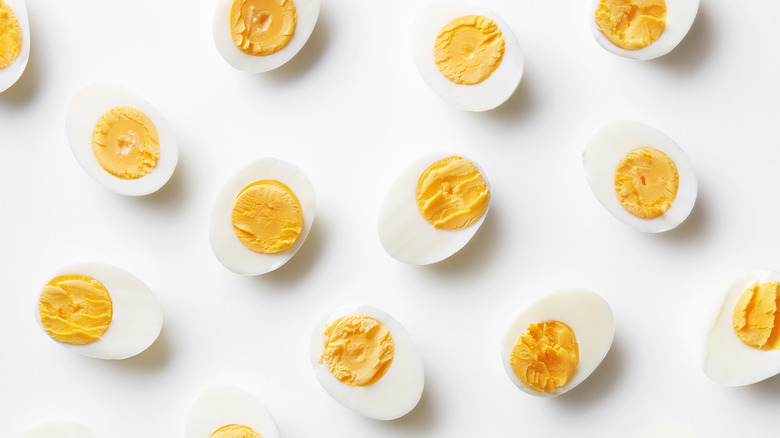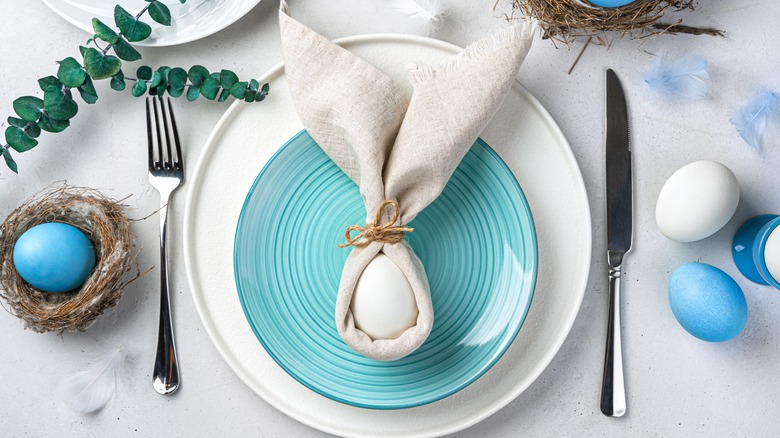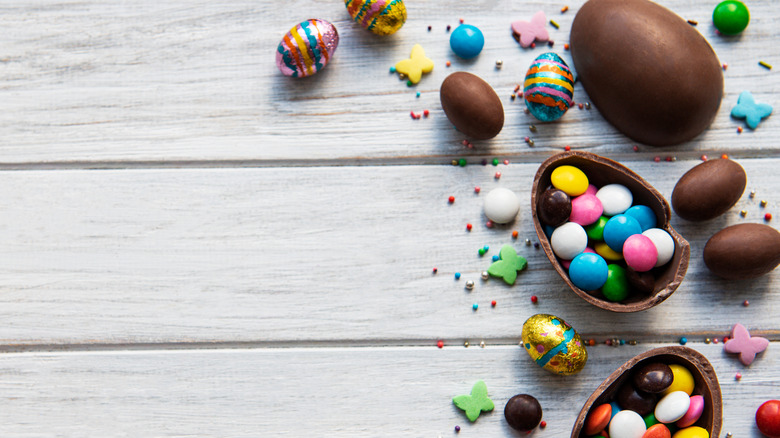Why We Eat Boiled Eggs On Easter
The egg spends much of the calendar year on the sidelines, without anyone giving it much thought or attention. A plain white orb that gets cracked open for breakfast or baking, robbed of its whites to make facial masks, or lobbed at homes on Halloween, people tend to take the common egg for granted. Once Easter rolls around, however, the egg's fortunes shift dramatically. It becomes the star of the show.
The egg's post-Lent transformation really is quite remarkable when you think about it. This seemingly insignificant protein is suddenly lavished with all sorts of attention. People decorate them in pastel hues. Adults hide them, so children can find them. Chocolate versions are consumed by the masses. And eating a boiled egg on Easter morning has become a time-honored tradition. Why does this ordinary food item garner so much attention and significance at Easter? The symbolism associated with this breakfast staple may surprise you.
Eggs were once forbidden during Lent
With over 180 million eggs and 10 million egg dye kits bought each Easter, it's safe to say the egg has worked its way into many families' Easter rituals. While there is some debate over why eggs became synonymous with this Christian holiday — some even say it has Pagan origins — there are some historical facts that may provide the answer. In an interview with Time, UCLA professor Henry Kelly explained the dietary rules around Lent were very strict in yesteryear. Christians were forbidden from eating any animal products, including eggs. As a result, they would boil up any that their chickens laid and save them for later consumption — which usually meant Easter, as it comes directly after Lent.
Even the Royals played a role in the development of the Easter egg. After abstaining from eggs for 40 days, it was commonplace for villagers to present eggs to the lords of their estates at Easter, and parishioners presented them to the church on Good Friday. The moneyed aristocracy decided to adopt this tradition as well. In fact, Edward I bought 450 eggs, had them lavishly embellished with gold leaf and other hues, and presented them to members of his household (via English Heritage).
The egg is filled with Christian symbolism
For Christians, the Easter egg has become symbolic of the events that transpired on Good Friday and Easter morning. The egg is a sign of new life, which calls to mind the resurrection of Jesus Christ. The Huffington Post adds that the cracking of the egg's shell is likened to the breaking open of Jesus' sealed tomb. In fact, the Orthodox and Eastern Catholic churches have a custom of dyeing Easter eggs red to mirror their savior's blood.
Many factors have earned the egg its lofty Easter status through the years, and it would seem this tradition is here to stay. With egg-centric events like the White House's annual Easter Egg Roll; the Guinness World Record-breaking Easter egg hunt in Winter Haven, Florida; and the world's largest roadside Easter egg in Alberta, Canada; people continually come up with new ways to pay tribute to this unassuming oval. Whether you like your eggs hard-boiled, with the yolk slightly runny, or made from Cadbury Creme, it's the perfect time to indulge in this Easter tradition.


